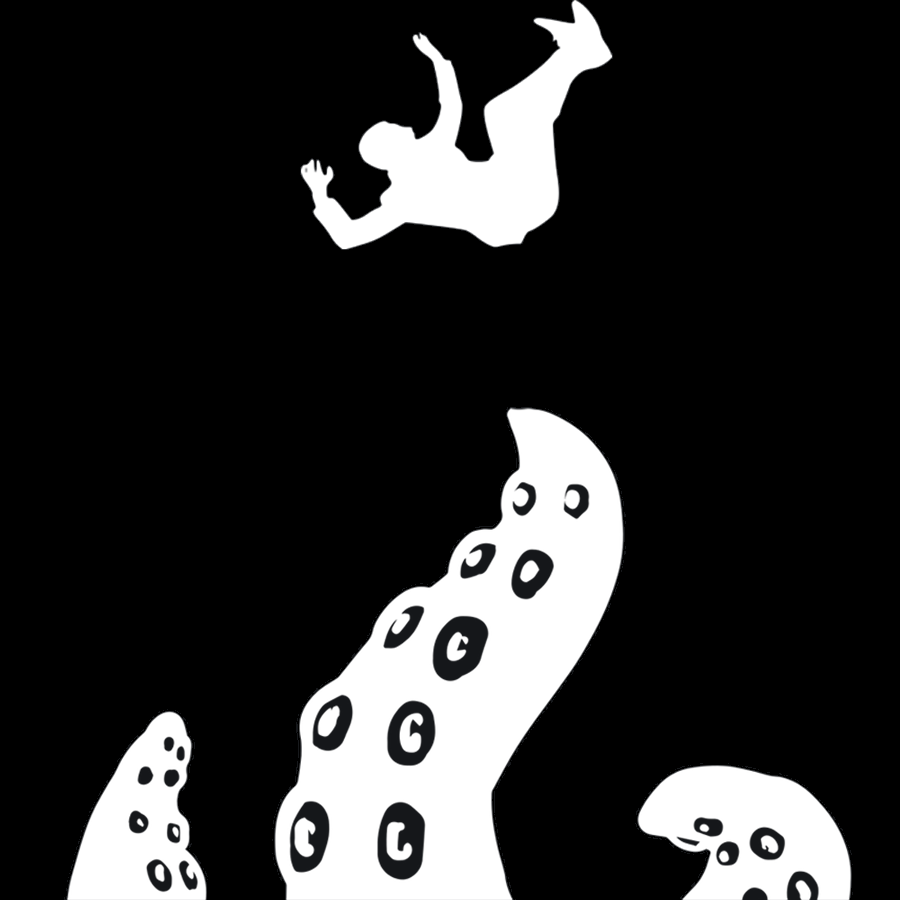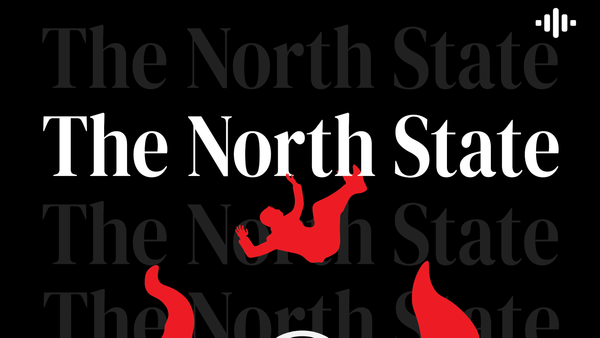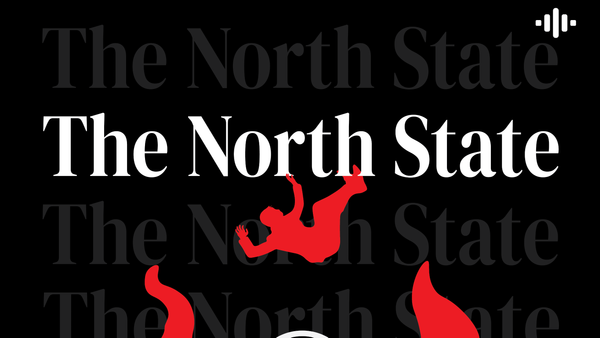Liberalism is Dead... and It's Not Coming Back
Don't fall for feel-good electoralist arguments

In the crucible of the French Revolution, the poster child for the global dominance of liberalism and capitalism, another country revolted against their tyrannical overlords. In Haiti, slaves had risen up against their masters to fight a brutal war for liberation. France, which had overthrown their monarchy, had grappled with what liberty, equality and fraternity had meant for French citizens, but many believed that their slaves and colonial subjects were exempt from these rights. Toussant L'Overture and the Black Jacobins showed, without a shred of doubt, that Black slaves were entitled to all that white colonialists believed was reserved for them... even if they had to take it themselves.
In response to their revolt, on February 4, 1794, revolutionary Maximilien Robespierre led the French Convention to abolish slavery. Robespierre, a key figure in the revolution, had despised slavery, even if it wasn't one of his top priorities. "You constantly allege the declaration of human rights, the principles of liberty," he said in May of 1791. "And you yourselves believed in it so little that you constitutionally decreed slavery."
This abolition did not last even a decade. Napoleon reintroduced slavery in 1802, where it remained the law of the land until 1848.
France's brief reckoning with liberation applying to enslaved people was the closest that liberalism got to its purported ideals. France crowned Napoleon as Emperor, and the Bourbon Restoration returned the monarchy to place of prominence before the second overthrow. Over the decades, France would colonize many other countries like Algeria and Vietnam. In the American Revolution, another landmark moment in the introduction of liberalism, slavery was preserved. Manifest Destiny, most exemplified by the exterminationist policies of Andrew Jackson, expanded the USA and committed further genocides against Indigenous peoples, entrenching settler-colonialism. Slavery was only abolished after a bloody Civil War almost 100 years after the revolution. After that, racist laws and proto-fascist intimidation from the KKK prevented Black people from participating freely in this liberal democratic society. Today, slavery is legal in the prison system, and the police have near-impunity to do what they please.
All this to say, liberalism, as an ideology, has never truly reckoned with its principles of liberty and freedom in contrast to its entrenched underclass. Entwined with capitalism, it has always been a destructive force. Whenever it improved, it was done by the efforts of dedicated social movements and the threat of democratic masses. Liberalism and capitalism was a large and necessary step away from the total domination of feudal monarchies, but not a total break. In this contradiction, it fostered its own opposition, which took two general paths. First, that liberation and equality should be extended to oppressed groups. Second, that any leeway given to these groups weakened the quality of life for the privileged in-groups. Eventually, this broadly translated to socialism in the former, and fascism in the latter.
Liberalism sowed the seeds of its own destruction over two hundred years ago. Collaborating with reactionary forces to destroy any socialist opposition ever since, the only alternative to the status quo offered is hard-right fascism. Liberalism has lost the fight.
Liberalism, a Brief History
Before moving forward, it's important to give a definition for liberalism. Liberalism has three main pillars: freedom of the individual, the right to private property and a market-based economy. Through this, accumulation of capital for the enrichment of the individual is seen as the driving purpose of society. Private property means property that creates capital for the owner, whether this is through leases/rent, or owning the means of production (ie. factories, resources, tools etc.).
In this definition, conservatives that prefer liberal democracy are also liberals, simply the right-wing of the ideology. More control given to markets, more individualization, more rights to those who own private property.
The first full-century of liberal capitalism rested on open exploitation of workers. Slavery before its abolition, underpaid workers in the imperial core and the labour and resources of colonized nations were all necessary to bolster profits and capital. Minor changes occurred for a myriad of reasons, the rise of unions, the economic unsustainability of slavery, concessions by the imperial governments and the threat of revolution abroad were all factors that raised standards for people, mostly in the imperial core. Through tireless efforts of civil rights and decolonial movements, these democratic forces forced systemic improvements for marginalized people. But colonialism mutated into neocolonialism, reactionary forces did all they could to hinder the progress of civil rights and neoliberalism entrenched itself. This "new liberalism" hollowed the government of its services, instead opting for privatization, hyper-individualism and prioritizing the profitability of markets above all else. Those concessions were now a liability, and they were revoked. This further blocking of the left shifted society further to the right.
Throughout all this, liberals, both left and right, agreed that socialism was unthinkable. FDR's New Deal was a successful effort to stop socialism in its tracks. The Red Scare saw both Republicans and Democrats agree to redbait and fearmonger about the Soviet menace. Liberalism's legacy remained tied to exploitation and war. The Cold War, Korea, Vietnam. Support for Apartheid South Africa, the Mujahideen in Afghanistan, Contras in Nicaragua. Coups in Chile, Iran, Guatemala. All of these saw broad bi-partisan support for the cause, if not the implementaton. Once the Soviet Union fell, imperialism spread further, unhindered by the competing social order. Iraq and Afghanistan exemplified the deeper global entrenchment of the US financial system.
But the centre cannot hold. Those fighting for further liberation were oppressed or co-opted by the liberal state, leading to disillusion. Those who wanted harsher crackdowns and more exploitation were frustrated by a refusal to fully capitulate to their demands. Meanwhile, the funding of right-wing forces to strangle socialism had shown that liberals were open to supporting fascism, if only it were not intended for themselves. This was a foot in the door that the right could use.
Unsurprisingly, stagnant wages, higher private profits, less public services and harsher living conditions do not improve things for the vast majority of people. Further shifting away from material improvements, demonizing any worker-driven movement as evil and "communist," and worsening conditions means people can only look one direction for improvement: right.
Fascism's Rising Tide
In the vacuum of socialist alternatives, the right filled the space with populist rhetoric. Fascism pays lip-service to an upending of the status quo but in reality, it triples-down on its worst aspects. Trump's promises to "drain the swamp," and his endless crude attacks on politicians exemplified the disgust people had for the status quo. But it also came packaged with racism, misogyny and cruelty. He plans to deport millions of people, deploy the military against "enemies within" and calls the Democrats "Marxists and communists and fascists." Meanwhile, he used his first term to enrich himself even further. It's all words. But words are all you need when the alternative is to remain stagnant.
Giorgia Meloni, Viktor Orban, Javier Milei. Far-right politicians that all climbed over the dissatisfaction with the liberal status quo to enact varying levels of fascist policy. Meanwhile, the traditional liberal has failed to meaningfully combat this rise, in some cases outright collaborating with it. After electoral liberals and leftists in France turned out to block the right-wing encroachment, liberal President Emmanuel Macron appointed a right-wing Prime Minister. Their solutions re-enforce neoliberalism, like Trudeau removing taxes on the construction of new homes, instead of having the federal government build housing as in the past. Harris promised to put a Republican in her cabinet if she won. In most liberal democracies, all elected officials at the levers of power have agreed that Israel's genocide of Palestinians is an acceptable price for an outpost of US imperialism.
Importantly, the US has been the greatest asset in the rise of fascism since the end of WWII. Their foreign policy has backed dictators the world over, siding with any government that promised to eradicate leftism. It made a mockery of international law by invading Iraq and Afghanistan. Billions are routinely sent to genocidal regimes. Fascism didn't do this. Liberalism did. Since the birth of liberalism and capitalism, oppression of peoples was fundamental to their continuation. The crackdowns and brutality committed against other nations show the methods to be used in the imperial core. Slowly, little by little, fascism proves itself to be more acceptable to an increasingly desperate population.
Legacies of racism, genocide and Third World exploitation are entwined with the US. This is to say that people may have, in large part, voted for Trump because they wanted economic change and improvement. But setting aside those that explicitly voted for his cruel, racist and fascist policies (and there are a lot), all others saw it as an acceptable byproduct. The US has been brutalizing people for decades, what's a few million more?
Canadians can look forward to this fascist creep, as well. Trudeau is incapable of defending the state of things. Poilievre, who, at the very least panders to fascists, is the only one offering a tangible alternative. Even if he and the Conservatives lose the next election, the Liberal party cannot win every election indefinitely. The Liberals are shifting right. Things will get worse. Where will you turn? Where will your neighbours turn?
Misdiagnosis
In the wake of Trump's resounding win, there have been a slew of think pieces about why the Democrats lost. Most worthwhile ones focus on messaging, policy, missteps, etc. The best of them rightfully decry the limp rightward shift and disastrous messaging that embodies the Harris campaign and the Democratic party veterans. However, they're always coupled with a lament that Harris and the Dems have refused to accept the "progressives." Very little, if any, have grappled with the question of why the Dems didn't take the progressive track.
Jon Milton of the Canadian Centre for Policy Alternatives wrote in The Monitor, for example, that centrism is dying. Milton directly references the French elections, omitting Macron's betrayal of the electoral left representation. Meanwhile, Luke Savage, writing in Novara Media, lamented that the Dems "reject transformative mass politics" and refused "populist messaging and any attempt to reach out to the progressive left."
It would be overwhelming to tackle all of these pieces, as many of them hit similar notes. So for this purpose, we'll refer to a salient quote published in The New Republic article "Democrats Need to Clean House Before They Screw Up Again."
In this analysis, Kat Abughazaleh argues for a complete transformation of the Democratic party, "whether its entrenched leadership wants it or not."
Rather than handing incumbents our votes because we fear the alternative, we need to realize that we have the power. And if Democrats refuse to listen, they don’t deserve our votes. This doesn’t mean you shouldn’t vote or you should go to the right. It means new blood, motivated by radical change rather than stagnant power, needs to storm this ineffective gerontocracy and earn our votes instead.
To be blunt, this is feel good pablum. If Democrats "don't deserve our votes," why should people vote? Presumably local elections and individual candidates are worth it (and I would agree) but no work is done to examine the exhaustion people have with the liberal status quo. Conversely, the Democrats have only won elections since the turn of the century by crusading on so-called "progressivism." Obama's campaign ran on "hope" then immediately bailed out Wall Street. All times they lost have been because they rejected even nominal "progressivism." The only possible exception that the Democrats could have won without campaigning on progressive ideals would be the 2000 election handed to George W. Bush by the Supreme Court, a result the Democrats accepted without a fight.
So they know. They don't care. Their party is not for the people. It's for their donors, their own enrichment, and the perpetuation of the system. The Harris campaign raised over $1 billion and is currently $20 million in debt. They're still asking people for money. Democrats have repeatedly undermined Bernie Sanders' attempts to lead the party. Sanders, who represents welfare-state liberalism, wants to continue the US machine, but with more public services. Even he is too far for the Democratic party. Any concession to the left, even a left that perpetuates capitalism, would undermine the system itself. They are liberals, their priority is the system. Canadians should look to our Liberal party as the same manifestation of capitalism.
I'm not going to sugarcoat it. We're in deep shit. Not just Americans, all of us. Those oppressed under the liberal order will face harsher treatment under a decisive fascist pivot. Those who push back will face retaliation. Crackdowns will strike any and everywhere. Places of worship, community centres, people in the street will all be attacked. Fascists are emboldened. Liberals are choosing to scapegoat the vulnerable. They will shift right. Things will get worse.
But there is a solution: organize. Contact organizations in your area that focus on community support. Homeless outreach, tenant unions, political organizations, Palestine liberation, COVID safety, HIV Clinics. Anything. Find something and do it. Learn what collective action can do. Educate yourself on how we got into this mess. There are podcasts, lectures, books and online communities that can help guide you on political theory. Local community reading groups can help you as well. Our politicians are not interested in saving us. They're interested in saving the system. Given a choice between the two, they will not even hesitate.
Liberalism has sold the lie that we can fix the system solely by voting in elections. Like the best lies, it contains a kernel of truth. Yes, certain political parties and electoral institutions have responded to popular movements and improved aspects of society for people. But the rot emanates from the structures of our political system. The way to fight that is by organizing in your community. Seeing change that people can bring on their own is invigorating. It's important. That's what will save us. Not a kinder, gentler, theoretical form of progressive liberalism. Discounting the material realities of how we got here, and the role liberalism played, is choosing to ignore reality.
Ignorance is easy. Knowledge is hard.
Take care of yourself. Take care of each other. Nobody else will.





